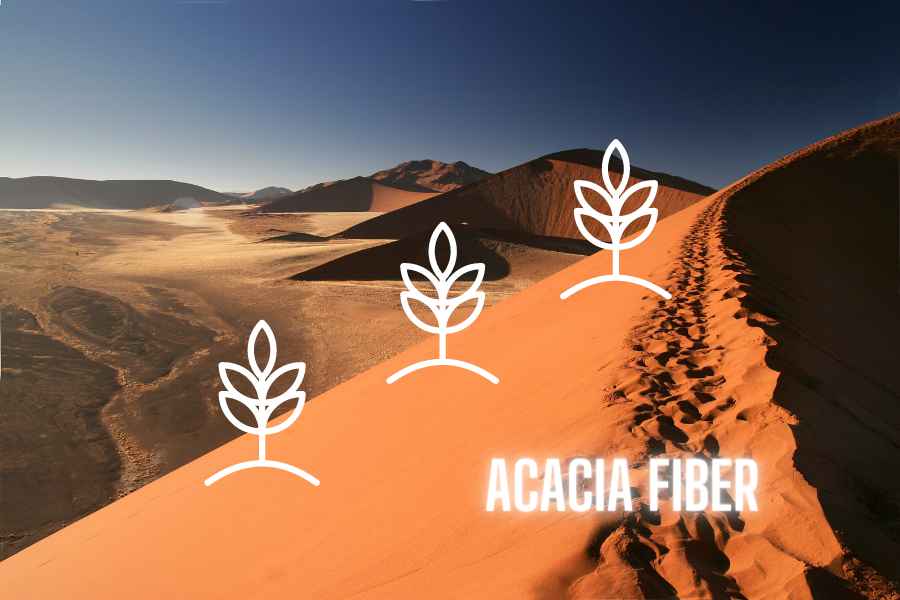WHAT IS ACACIA FIBER?
Acacia fiber or acacia gum, which is exuded from acacia trees, is a polysaccharide gum that the body cannot digest, or is insoluble. Acacia fiber is not broken down in the intestine but can be fermented in the large intestine, or colon (Min et al., 2012). The fermentation in the large intestine occurs quite slowly, which may decrease the prevalence of uncomfortable gastrointestinal symptoms that often accompany dietary fiber consumption. In addition, acacia fiber acts as a prebiotic, a plant fiber that supports the growth of healthy bacteria (Mayo Clinic, 2021).
However, dietary fiber intake has a more hidden function - improving the gut microbiome. The gut microbiome is the composition of healthy and unhealthy bacteria and microorganisms in the gastrointestinal tract. Overall health, and even mood, are associated with beneficial gut bacteria (Mayo Clinic, 2021).
STUDIES ON ACACIA FIBER BENEFITS:
- A study by Saha and Dey in 2021 found that acacia fiber was associated with an increase in beneficial gut bacteria, such as Lactobacillus and Bifidobacterium, while decreasing harmful microorganisms, such as Escherichia coli and Clostridium. While the emphasis in the media often tends to be on probiotics — foods and supplements that contain live organisms, such as kombucha and sauerkraut, prebiotics are just as essential in promoting a healthy gut microbiome.
- Adequate dietary fiber provides a suitable environment in the gut for healthy bacteria to live and thrive. Research shows that a healthy gut microbiome and symbiosis, a favorable relationship between the bacteria and the host, can reduce the risk of type 2 diabetes, obesity, and heart disease (Myhrstad, Tunsjo, Charnock, & Telle-Hansen, 2020).
- In a study performed by Min and colleagues in 2012, 130 patients with Irritable Bowel Syndrome (IBS), half of the individuals were given a yogurt supplemented with acacia dietary fiber, along with a Bifidobacterium, while the other half received a regular yogurt. The researchers found that the group that consumed the supplemented yogurt had significantly higher satisfaction with their IBS symptom management and bowel habits than the control group.
Furthermore, dietary fiber has been shown to increase satiety and appetite, and improve weight management.
When an individual consumes a food high in dietary fiber, they chew more frequently, promoting greater salivation and, therefore, more satiation when eating (Slavin, 2013).
Fiber also may slow gastric emptying, partially digested food leaving the stomach and entering the small intestine—slow gastric emptying results in steady glucose and insulin reactions, correlated with satiation after eating. Logically, increased satiety results in decreased food consumption because the body recognizes earlier that it is full and satisfied, which may result in helping to maintain a healthy body weight.
Overall, acacia fiber, and other dietary fibers, have many far-reaching benefits, including improvements in cardiovascular disease, type 2 diabetes, gastrointestinal regularity, body weight, cancer risk, and much more (Slavin, 2013).
Want to start adding acacia fiber in your diet so you can feel the full effects of this super food? Try GEO today and experience the benefits for yourself!

